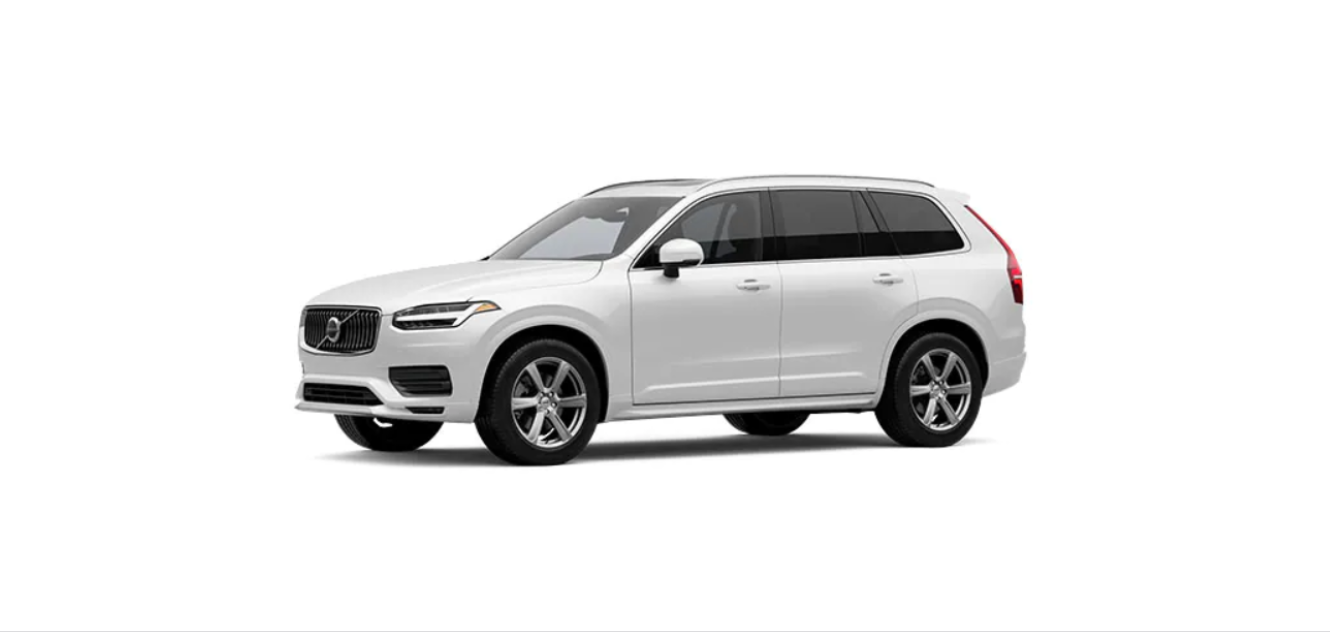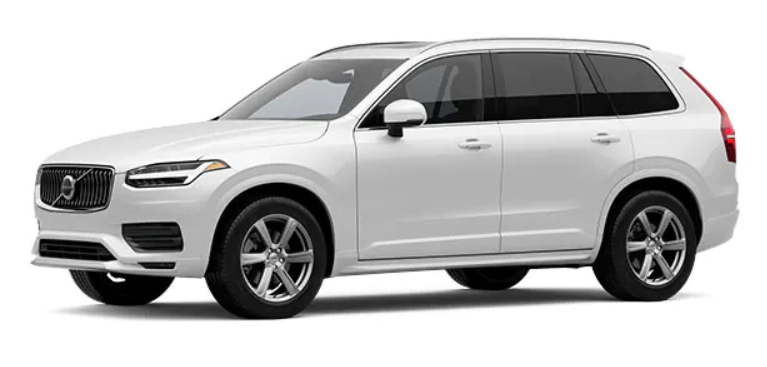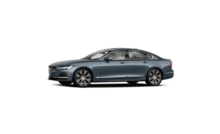Full-cover position
For 5-seat car
Grip the handle and pull out the cargo cover so that it slides over the side panels in the cargo area. Pull to the end position.
When the cargo cover is extended so that it covers the cargo area – guide the cover’s attachment pins into the grooves in the side panels and release, while at the same time angling the handle with a light downward pressure.
The cargo cover is locked in the full-cover position.
For 7-seat car
Grip the handle and pull out the cargo cover so that it slides over the side panels in the cargo area. Pull to the end position.
When the cargo cover is extended so that it covers the cargo area – guide the cover’s attachment pins into the grooves in the side panels and release, while at the same time angling the handle with a light downward pressure.
The cargo cover is locked in the full-cover position.
Do not load objects on top of the cargo cover.
In a 7-seat car, never have the cargo cover fitted when there are passengers in the rear seats. This may lead to serious injury in the event of a collision.
Loading mode
From the retracted position – grip the handle and pull out the cover so it slides over the side panels in the cargo area – pull to the end position and guide the cargo cover’s attachment pins into the grooves in the side panels. (If the cover is already in the full-cover position – see the next point)
From the full-cover position – grip the handle and guide the cargo cover’s attachment pins into the grooves in the side panels and release.
Retract the cover until it stops in the loading position.
In the event that your hands are occupied:
In the extended full-cover position – lightly push the handle part of the cargo cover upward, e.g. with an elbow.
The cover retracts until it stops in the loading position.
To return to the full-cover position from the loading position:
Grip the handle and pull the cargo cover out to the end position.
The cover is locked in the full-cover position.
Retracting
- From the full-cover position:
- Lift up the handle and pull it back to disengage the cargo cover’s attachment pins and then release.
- From loading position:
- Grip the handle and pull out the cargo cover in the grooves – pull to the full-cover position. Lift up the handle and pull it back to disengage the attachment pins and then release.
- Retract the cover with its attachment pins outside of the side panels until it stops in the retracted position.
Fitting and removing cargo cover
Fitting cargo cover
Insert one of the cargo cover’s end pieces in the recess in the side panel in the cargo area.
Then insert the other end piece in the recess in the side panel on the opposite side.
Press down the end pieces on both sides – one by one.
When a “click” is heard and the red marking on each end piece has disappeared, the cargo cover is attached – check that it is affixed securely.
Removing cargo cover
- In retracted position:
- Depress the button on one of the retracted cargo cover’s end pieces and lift out that end.
- In a 7-seat car – release the third seat row’s seatbelt locking tabs from the hooks above the side panels.
- Angle the cover-up/out carefully.
- The other end piece loosens automatically and the cover can be lifted out of the cargo area.
Fitting and removing safety grilles
For safety reasons, the safety grille must always be attached and anchored correctly.
Warning
Under no circumstances may anybody remain in the cargo area while the car is moving. This is to avoid injury in the event of heavy braking or an accident. The safety grille’s parts consist of the grille and two loose attaching braces. The attaching braces each come with a screw cap and there are two plastic sleeves for the safety grille.
Warning
The safety grille must only be used in the rear position described here. The roof mountings behind the front seats are not intended for the safety grille.
Warning
For safety reasons, the third seat row must be lowered when the safety grille is fitted in the car.
Important
It is not possible to have the protective grille fitted at the same time as the cargo cover.
Installation
Lower the rear seat and then lift the safety grille in through one of the rear side doors or via the tailgate – the arched/convex side of the grille should face the cargo area while the hooks on each side point up. The attaching braces and plastic sleeves are not used in this stage.
- Guide one of the safety grille’s hooks into the larger opening in the roof mounting (1).
- Grasp the grille near the hook and pull/slide it towards the smaller opening (2).
- The hook is now secured in the roof mounting’s end position.
- Repeat the steps in point 2 above to secure the other hook in the mounting on the other side.
Warning
Make sure the hooks of the safety grille are securely fitted in the roof mountings so there is no risk of the grille coming loose.
- Hook the attaching brace’s hook through the load securing eyelet at the cargo floor from underneath, and guide the threaded part through the cargo grille’s lower attachment hole from underneath (1).
- Slide a plastic sleeve on the threaded part of the attaching brace – the sleeve flange should face up – and guide it down through the hole. Then screw on the screw cap until its lower edge is approx. 5 mm from the
- grille (2).
- Repeat the steps in point 4 on the other side.
- Center the safety grille and then tighten the two attaching braces alternately until the grille is properly secured.
Fitting and removing the safety net
The safety net is fitted into four mounting points.
For reasons of safety, the safety net must always be fastened and anchored as described below.
The net is made of strong nylon fabric and can be secured in two different locations in the car:
- Front fitting – behind the front seats.
- Rear fitting – behind second seat row.
Loads in the luggage compartment must be anchored well and also using a correctly fitted safety net.
Fitting the safety net
Check that the safety net’s upper mountings are correctly fitted and that the puller-straps are securely hooked on.
Damaged safety nets must not be used.
With forward mounting, the safety net is most easily mounted via the rear doors.
- Unfold the safety net and make sure that the split upper rod in the net is locked in its extended position.
- Hook one retaining hook of the net into the front or rear roof mounting with the anchoring strap locks turned towards you.
- Hook the net’s second attachment hook to the roof bracket on the opposite side. The telescopically sprung attachment hooks make it easier to fit. Take care to press forward the net’s retaining hooks for each respective roof mounting’s front end position.
Rear fitting.
For rear fitting:
With the net fitted in the rear roof mountings, hook the safety net’s puller-straps into the front load retaining eyelets in the cargo area.
Front fitting.
For front fitting:
With the net fitted in the front roof mountings, hook the puller-straps into the outer eyes on the rear of all seat slide rails. The procedure is facilitated if the backrests are straightened and the seats are moved forward slightly.
Pay attention to make sure that you do not exert hard pressure on the net when the seat and backrest are moved back again. Only adjust until the seat or backrest makes contact with the net.
Important
If a seat or backrest is pushed back hard into the safety net, the net and roof mounts may be damaged.
Tension the safety net with the anchoring straps.
Removing the safety net
- The safety net can be easily removed and folded up.
- Reduce safety net tension by pressing the button in the anchoring strap lock and feeding out a little of the anchoring strap on each side.
- Press in the catches and detach both of the anchoring strap’s hooks.
- Undo the upper attachments and release the net from the roof mountings.
- Press the red button on the rod to enable folding and then roll up the net. Store the net in its case.




